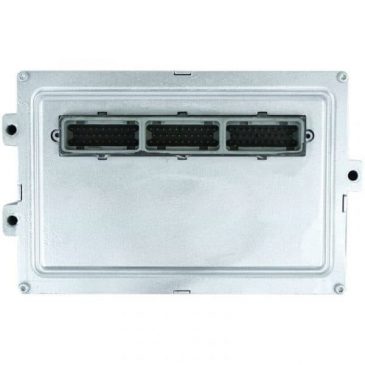Last updated on November 1st, 2024 at 11:49 am
A motor vehicle’s mechanisms consist of several components, some which promote the car’s overall performance. This ranges from position sensors to control units and even computer systems. However, mechanical and electrical components might fail to function properly at times, resulting in several drivability constraints such as poor transmission and fuel inefficiency.
Whenever the “check engine light comes on, there is always an issue in disarray inside the engine. The PCM (Powertrain Control Module) is tasked with controlling various aspects of your car’s functionality and is essentially the brain of the vehicle. With assistance from sensors, onboard computers and other devices, the power-train control module regulates and improves engine performance.

Here is a brief overview of PCM, including its definition, role, defects and more.
Defining PCM’s role in vehicles
PCM is one of the central onboard computer circuits, with a primary function of regulating and monitoring engine efficiency and performance. However, it controls various processes such as braking and transmission and has multiple codes to help in sensor monitoring. The PCM is essentially a combination of the ECU (engine control unit) and TCU (transmission control unit).
The PCM accomplishes its job by processing inputs, collected real-time sensors that are spread all over the car’s trim. The signals from the sensors are also intercepted by transmission modules, like in automatic transmission engine shifts, management and performance control. PCM regulates various computer processes and also diagnoses issues with engine performance.
However, despite its capabilities to point out engine defects, damaged PCM can sometimes be the root of your problems. As such, it is essential to ensure you have a fully functioning PCM unit in your car.
Symptoms of a damaged PCM
A properly functioning PCM checks for engine defects and is oriented in ensuring that the control modules performs at optimal levels. However, not every PCM alert results from internal component errors. If you examine the entire car and find no issues, consider checking the PCM for potential damages.
While repairing the device would require professional mechanics attention, checking for damage signs in the PCM is not as daunting. What’s more, you can either choose to replace the entire PCM unit or just the damaged parts as it is possible to replace different parts of the unit. Some systems also have multiple computers, so you can diagnose to determine the defective part. Two symptoms that signify a damaged PCM:
a) Poorly running engine
Poor engine performance is a prime symptom for diagnosing faulty PCM, although they can imply an even more significant problem. Damaged PCM mechanisms can cause erratic engine behavior, which is always a good ground to hire PCM inspection and repair services. If the PCM is dysfunctional, you may experience various issues with the engine ranging from fuel economy to braking, gear shifts and transmission, among others.
The PCM relies on sensors that collect data from different parts and transfers them via the transmission control module for analysis checks. This can assist in optimizing engine performance as it detects any errors as soon as they occur. If the engine is running poorly for no reason and everything in the vehicle is in good shape, chances are you need a PCM repair or replacement service.
b) Increased emissions or darker emissions
Your car will likely fail the emissions test if they have severe PCM issues. If besides the typical symptoms, you notice your vehicle produces extra emissions, there might be a pending defect in the engine, or the PCM may not be functioning correctly. In addition to controlling fuel fixtures, PCMs also regulates the vehicle’s emission.
For instance, when excess fuel is delivered into the engine, over emissions may occur. This requires proper instruction to restore regular fuel feed and resolve any performance issues that have been caused by the error. It doesn’t have to be increased emission volume. Sometimes the exhaust expels peculiarly-colored smoke, which may contain a foul smell.

Other symptoms that may indicate problems with the powertrain control module pcm include:
• Engine fails to start
• Check engine light is displayed
• Several error codes are activated
Conclusion
The PCM is the brain of your car’s computer and controls several processes concerning performance, sensors and engine transmission. As a power-train module, it houses both engine and transmission control units that are designed to diagnose and troubleshoot performance problems before they become significant issues. A faulty PCM may result in other components failing due to poor reading and sub-par engine performance. It is, therefore, recommendable to request PCM reset before and after performing major repairs. This resets all codes and also restores engine performance unless more issues arise. The symptoms of bad PCM might also arise from defects in other components besides the PCM. As such, you should always contact a trusted mechanic and have the problem fixed promptly to avoid causing further damage to the car.
FAQ
A bad PCM shares symptoms with defects in other components, so there isn’t a specific bad PCM symptoms. However, erratic changes in engine performance, check engine light indication and failed ignition are all possible signs of a damaged PCM. In most cases, if other components seem normal, the engine performance issue likely stems from bad PCM.
Each car has a unique PCM and the price of a new unit ranges from $450 to $1,800 or more. The labor cost for fitting your new PCM also cost anywhere between $50 and $150. New replacements usually come with programming and ensuring all codes are running as intended. At flagship one you can find one for half the price.
Many people believe PCM and ECM (or ECU) are the same, which is valid to some extent. PCM (power-train control module) controls both engine performance and transmission while ECM (electronic control module) only controls issues about the engine. Many modern cars feature a PCM as it regulates both the ECU and TCU.
There are many specific reasons why a PCM unit might fail. However, voltage overload and environmental factors such as weather elements, extreme heat, vibration and cracked circuit board remain the top causes of PCM failure.



